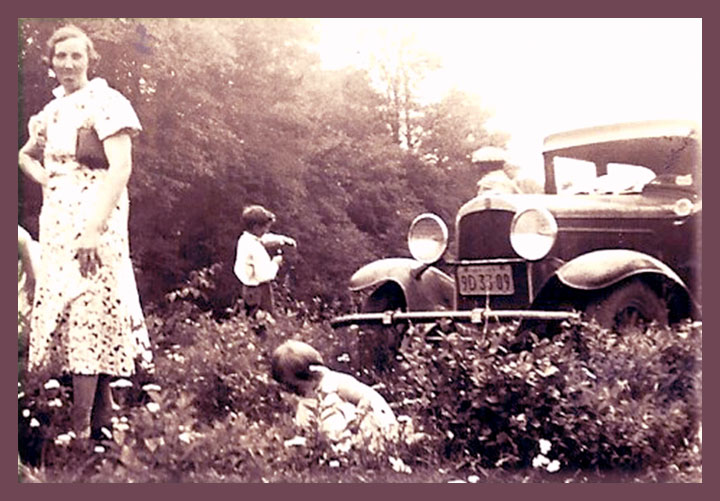“I love you,” said Ella.
“I love you,” Carl answered and held her. When they kissed, their heads pushed into the hay of the mow and they could smell the sweetness of the dry grass beneath. They didn’t see the gleaming flash of moonlight across the blade of shining steel pointing at them, nor hear the pushback of the barn door, or the footsteps padding softly toward where they lay. But suddenly the light of the moon was gone.
Across the yard rose the Price House, a large two-storey 10-bedroom building planted on a square of land called the “house lot” by those who lived in it. There was a toilet perched outside its back door, shingled to match the house and barns, and a well-house, just off the porch at the front. It sat atop a pushed-up round wall of “found” stones from the surrounding fields and had the familiar faded-green shingled roof that matched every other, even the chicken coops. A loud cranky handle poked out one side with a galvanized pail at the end of a wound of thick rope.
The “house lot” was surrounded by other plots named for what was planted there each year: the corn lot, the potato lot, the bean lot, the rhubarb lot, a pumpkin lot, and far below those, the wintergreen lot of low plants with dark waxy leaves and imperfect spotty pink berries poking out like the nubs of melted birthday candles.
“Look,” my Aunt Violet cried, who wasn’t my aunt yet, as she was only nine and I had yet to be born. Violet’s father called her the “miracle baby,” for she came only four months after he was married. Her mother, who grew very religious after learning of her pregnancy, treated those four months as if hers was almost a Virgin Birth. “Violet developed very quickly,” her mother said of her miracle, which occurred on the last day of November 1933, when it was almost Christmas. The next year, in May, my mother-to-be would be 10. My father turned 11 four days earlier, and I wasn’t to arrive on earth for another seven years.
“Look!” cried my not-yet aunt, and ran to the window with her brothers and sisters following. They collected at the casing and looked out at the dark winter night. The ice and snow of the wintergreen lot was lighted bright as day by some unknown energy. It was other-worldly and occurred often in the wintergreen lot. But no one understood why there was light at night more intense than any ordinary day. The field was electrified, as if a hundred florescent lights shone upon it from above. There wasn’t a shadow anywhere. The ice sparkled off the wintergreen berries, and their shiny dark leaves, still green under the snow, reflected that light from an invisible source that wasn’t, necessarily, overhead.
The family knew it wasn’t St. Elmo’s fire, for there were no cattails in the wintergreen field to spontaneously combust, and nothing else for burning, neither hay nor straw.
There was one loud knock on the front door, and as if by magic the field went dark. Violet and her family turned from its blackness and she ran to answer. Standing there in the opening was her uncle.
“Eller’s gone!” Mel groaned. “Your Aunt Eller’s runn’d away!” He came inside, his head almost touching the ceiling, for 1800s doorways and rooves were low to keep the coal-stove heat inside. Uncle Mel sat down on the slouching brown sofa and wedged himself between its two pillows. “I wonder where she’s gone?” he asked as if to himself. “And why she’s runned away?”
Aunt Ella was never heard from again. There were rumors after, for someone else was gone away too, a man everyone talked about in whispers. His name was “Carl . . . Carl . . . ,” and he seemed somehow attached to Aunt Ella, like a Peter Pan shadow.
A distant relative who visited a clairvoyant came back with this message: “They were murdered and buried somewhere there’s water.” Everyone took in the message and shared understanding looks, but nothing else was said aloud.
“I think they’re somewhere in the wintergreen lot,” said someone who quickly added, “But don’t quote me.”
Everyone had doubts because the night of Aunt Ella’s disappearance, Uncle Mel decided to add a bathroom to his house and water to the kitchen sink. By the light of kerosene lamps hung on beanpoles, he dug deep trenches and coupled copper pipes that snaked through his holes in the ground. Afterward, when anyone came around they commented on the talking water that flowed in his underground pipes.
This was the country, and while folks thought it was strange to dig up frozen ground in the wintertime to install plumbing, no one said anything.
Though when Violet looked through the windows at her Uncle digging and saw the copper pipes shine in the glint of lantern light as he put them together, she thought his work was as mysterious as the unexplained light above the wintergreen meadow.
The next morning Uncle Mel invited everyone in to see his running water. “Should have done this when yore Aunt Eller was still here,” he said. “I should’ve done it fer her. She would’ve liked to hear the running water. I’ll think of her whenever I turn on the faucet.”
“Would he think of Carl too?” my not-Aunt Violet wondered. She was very perceptive. She understood things other people didn’t.
“There’s a separate pipe to the bathroom,” said Uncle Mel when he saw my not-Aunt staring up at him. He winked. “I have a cesspool too.”


